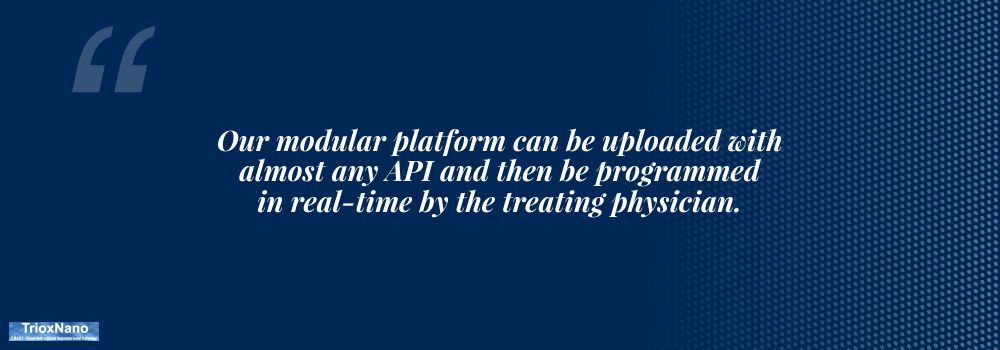Biotechnology is a field of science that achieved major breakthroughs for treatments of human disease. PCPM (Point of Care Programmable Medicine or shortly Programmed Medicine) is leading a paradigm shift in biotechnology which allows uploading program codes to a medicine prior to administration to patients. These codes control the medicine’s distribution and targeting to specific tissues (cancer) / cells (bacteria) decreasing its unwanted effect on the healthy tissue / uninfected cells.
TrioxNano has been leading the revolution of Programmed Medicine since its inception in 2015, with an innovative approach to the field of biotechnology, TrioxNano substantially improves the safety window (LD50/ED50) which is the ratio between toxicity and efficacy of medicines such as chemotherapies and antibiotics.
Established in Israel, TrioxNano is the brainchild of Dr. Roy Farfara, MD who spearheads the company’s discoveries and research as its founder and CTO in collaboration with the company’s highly skilled scientists. With an encompassing vision, Roy finds himself in a unique position as the inventor of programmed medicine technology and quotes, “I am humbled to have the opportunity to see my vision of programmed medicine transform into reality, through the hard work of TrioxNano’s amazing team of ultra smart scientists’”.
Disrupting the field of Oncology
TrioxNano develops programmable biologic nanocarriers. Its 1st generation technology—S.M.A.R.T(Stimuli Multi Adjusted Responsive Technology) accurately delivers payloads to their targets using DNA molecular machines set up in the manufacturing process to target known variables in the cancer tissue. PCPM breakthrough technology is based on S.M.A.R.T Technology to achieve it TrioxNano developed three components integrated into a comprehensive technological solution:
1. Hardware
2. Operating system
3. Software
Once proof of concept was achieved, TrioxNano began programming different codes to control different functions of PCPM’s activity and later specific codes. Despite targeting oncology and infectious indications, TrioxNano’s technology is relevant for many other human diseases, successful experiments loading PCPM with many types of APIs such as diagnostics dyes (that recognize metastasis), and even CBD! TrioxNano believes that once programming of medicine is accepted on a wider scale the possible indications of approved molecules may be broadened and the use of lower doses and increased efficacy will allow approving many currently unapproved molecules due to their unacceptable toxicity.
PCMP technology has important potential in the field of programmed chemotherapies. Chemotherapies are effective against most cancers, and their efficacy is directly related to their concentration inside the studied cancer cells. However, Chemotherapy toxicity limits the possibility to deliver high doses due to nonspecific distribution to healthy cells. Moreover, scientists agree that a 3-10 times higher dose could be delivered to the cancer response rates and improve cure rates! Pursuing the very motive, TrioxNano’s PCPM increases concentration of chemotherapy dose arriving at the cancer tissues while reducing its concentration in the non-targeted areas.
Overcoming challenges
TrioxNano upholds a novel approach in the field of biotechnology. Staying ahead of its time is a challenge for example with the regulatory authorities, and questions such as which clinical experiments are required to approve it, as well as others. TrioxNano was funded by the prestigious EU H2020 Horizon program that allowed it to establish its technology and is now hoping to receive a direct investment of 15 million Euros from the program’s investors.
Upgrading Programmed Medicine
In the upcoming years, the company targets at revolutionizing the ability to program medicine in real-time and improve their therapeutic window. It is currently being tested on human cancer cells. The company has developed program codes that are based on previous literature knowledge regarding cancer. For instance, in the case of TNBC (an aggressive form of breast cancer), literature states the abundant presence of proteins like Nucleolin, Mucin1, PDL1 in the cancer cells. Using this knowledge, TrioxNano has created programs that are uploaded into its modular particle, precisely designed for each specific protein. This enables a patient with Mucin1 protein in their cancer cell to be administered with a program designed for Muc1.
Addressing Limitations with Revolutionary Data
With limitations to human knowledge, all the proteins constituted inside specific tissue such as a tumor have not been comprehensively described yet. In case of a cancer patient, different metastases show different traits. With treatment, the cancer cells keep evolving dynamically. Although proteomic technologies allow differentiating thousands of known proteins at a time, it does not address their treatment and requires a further degree of complication to diagnose and create a treatment for it.
Lately, TrioxNano came out of stealth mode with its TDP ‘Tissue Derived Programming’ technology, which complements the potential of programmed medicine and enhances it. A revolutionary data concept which allows taking the tumour as a template to directly create the programs that will lead the medication to the target tissue, this will allow the company to transcend the knowledge gap and comprehensively differentiate between disease-affected and healthy tissues.
TrioxNano’s effectual technology allows to choose and upload the correct sequences, out of the 10^35 different sequences, for successful treatment. It lowers the current reliance on human knowledge. It also implies successful treatment of aggressive forms of cancer like TNBC, with a combination of knowledge based programming along with tumour derived programming for the yet undiscovered proteins.
Transformations in the Industry
Roy believes that the most prominent transformations in the biotechnology industry in the last years are the acceptance of mRNA vaccine technologies, along with the adoption of immunotherapies and DNA molecular machinery. The COVID-19 pandemic proved the advantage of RNA vaccines over the old technologies of using weakened viruses.
As TrioxNano’s technology is based on DNA machinery, the company is enjoying strong backwind since it is using DNA machinery to program codes which are also related to immunotherapy. Additionally, Roy also envisages a wider acceptance towards disruptive technologies such as PCPM and TDP.






